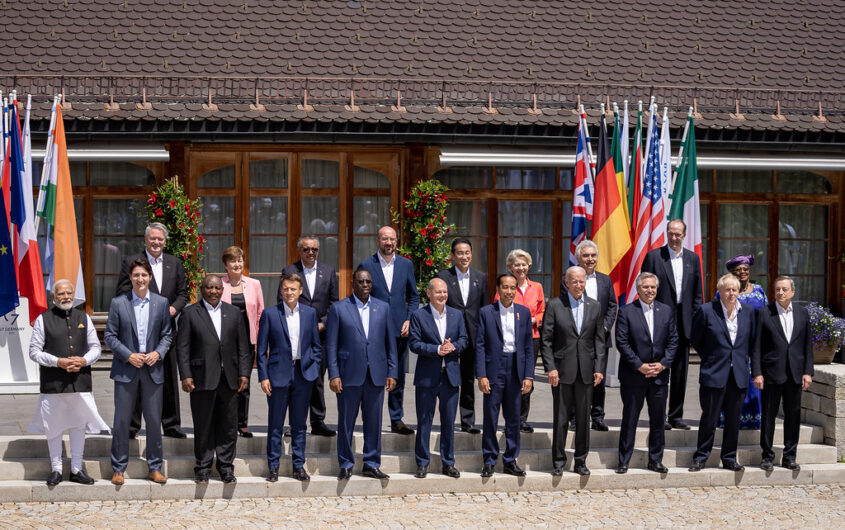
The White House via Flickr
The Transatlantic Community and the Global South in the Age of Great Power Rivalry

Rolf Mützenich
Dr. Rolf Mützenich has represented Cologne as a Member of the German Bundestag for the Social Democratic Party (SPD) since 2002. Dr. Rolf Mützenich is the Chairman of the SPD parliamentary group in the German Bundestag.
His work focuses on foreign policy and arms control. His areas of expertise are transatlantic cooperation, Russia, Afghanistan, and the Middle East (with a focus on Iran). Rolf Mützenich previously served as an alternate member on the Foreign Affairs Committee, the Defense Committee, and the Committee on Human Rights and Humanitarian Aid.
From 2009-2013, he was Speaker on Foreign Affairs for the SPD Parliamentary Group in the German Bundestag. He also served as the group’s speaker on disarmament from 2004-2009. Apart from his foreign policy focus, Rolf Mützenich is committed to working with social and youth associations. Rolf Mützenich studied political science, history and economics, and he received a Doctorate from the University of Bremen in 1991.
Read More
In 1980, the Independent Commission for International Development Issues, chaired by former German Chancellor Willy Brandt, published a landmark report entitled “North-South: A Program for Survival.” In the midst of the tensions of the Cold War, the “Brandt Report” addressed the entrenched disparities between industrialized and developing countries and called for reforms in global economic policies and greater participation of developing countries in the decision-making processes of international institutions. Furthermore, the report also addressed global challenges such as rising inequality, environmental sustainability, and arms control. Although the “Brandt Report” was never fully implemented, it significantly influenced the international development discourse and marked a pivotal moment in North-South relations. Even forty-four years later, many of its core principles remain relevant and can serve as valuable guidelines for reinvigorating relations between the Global South and North.
However, while we still grapple with many of the challenges outlined in the “Brandt Report” of 1980, the world has also undergone transformative changes in recent decades. We no longer live in a uni- or bipolar order, but in a multipolar world in which several global and regional centers and poles compete for power and influence. After centuries of Western predominance in the international system, the global balance of power between states is shifting dramatically. Many countries south of the “Brandt Line” have evolved into emerging great and middle powers and have become influential players on the global stage—above all China and India, but also countries such as Brazil, Indonesia, and South Africa.
However, the emerging markets and developing countries of the Global South remain very diverse and heterogeneous—both in terms of their economic and political prowess and their interests. According to Sarang Shidore, the Global South “exists not as a coherent, organized grouping so much as a geopolitical fact.” The concept of the “Global South” therefore remains vague and ambiguous. In principle, the term “Global South” encompasses those countries that we once referred to as the “Third World,” i.e., essentially Africa, Latin America, and the Caribbean as well as large parts of Asia. The historical evolution of the Global South can be traced back to pivotal events such as the Bandung Conference in 1955, the establishment of the “Non-Aligned Movement” in 1961, and the formation of the G-77 within the United Nations in 1964. Currently, 134 countries belong to the G-77 group. They define themselves as “the largest intergovernmental organization of developing countries in the United Nations.”
In the wake of the war in Ukraine and the intensifying strategic rivalry between China and the United States, the emerging markets and developing countries of the Global South have been growing in geopolitical importance. What is more, these states are also increasingly assertive in pursuing their own national interests. Many countries in the Global South have not yet unequivocally condemned Russia’s attack on Ukraine, let alone joined the Western sanctions. It appears that these countries are no longer willing to blindly follow the wishes of their former colonial masters. Instead, many emphasize the fact that they are disproportionately affected by increasing food and commodity prices and the deepening sovereign debt crisis—and that the West itself has only selectively applied international law in the past. Indeed, the West has experienced a significant loss of credibility in the Global South in recent years due to its unsuccessful interventions in the Middle East and Africa, its own disregard for international norms, or the vaccine protectionism during the COVID-19 pandemic.
What is more, in light of the growing geopolitical importance of the Global South, major powers have been making efforts to strengthen their presence in the region. Particularly China has significantly expanded its influence in the Global South through projects like the Belt and Road Initiative. Between 2000 and 2021, Beijing is reported to have financed more than 20,000 infrastructure projects in 165 countries. In addition, China established its first military base on the African continent in Djibouti in the Horn of Africa in 2017. India is also increasingly positioning itself as a champion of the countries of the Global South. New Delhi has emerged as Africa’s second-largest trading partner country after China, though the EU remains Africa’s largest trading partner overall.[1] But China and India are not alone. States like Russia, the United Arab Emirates, and Turkey have also sought to increase their strategic footprint in Africa over the years. This heightened interest in Africa—and the Global South as a whole—is primarily aimed at securing access to vital raw materials, exploring new markets, and securing their votes in international institutions such as the UN General Assembly. The increased attention from major powers undoubtedly opens up new opportunities and possibilities for the countries of the Global South. They now have a broader array of options to choose from and can therefore better pursue their own national interests.
The renewed great power rivalry and the ascent of the Global South also compel transatlantic partners to rethink our position in the world. The mode in which we operated in the past—both within the NATO alliance but also, and particularly, with the countries of the Global South—needs to change. Indeed, the West needs to develop what Willy Brandt termed “Südpolitik” in his speech at the inaugural meeting of the Independent Commission in 1977. This entails pursuing new, more equitable, and deeper forms of cooperation with the countries of the Global South that yield mutual benefits. German Chancellor Olaf Scholz has made the revitalization of relations with emerging markets and developing countries a key priority of his foreign policy agenda. For example, Chancellor Scholz invited representatives from Global South countries to the G7 summit in Elmau in June 2022 and called for a reform of the international order in his speeches to the United Nations in September 2022 and 2023.
The West needs to develop what Willy Brandt termed “Südpolitik.” This entails pursuing new, more equitable, and deeper forms of cooperation with the countries of the Global South that yield mutual benefits.
Moreover, if we want to revitalize our engagement with the Global South, it is crucial that we do not pressure the countries of the Global South into choosing sides. Nor should we automatically dismiss their cooperation with China. Instead, it is important that we extend our own and better offers—such as with the EU’s Global Gateway Initiative. Europe and America should bolster cooperation and coordination and adopt a more focused and strategic approach. Furthermore, we should enhance collaboration with Global South countries and foster joint initiatives, especially with India. As the world’s largest democracy, New Delhi could be an important bridge between the West and the Global South. For instance, the “India-Middle East-Europe Economic Corridor” agreed at the G20 summit in New Delhi in September 2023 could serve as a flagship initiative in order to mitigate China’s influence in the southern hemisphere.
Simultaneously, the transatlantic community should strive to democratize the international order. International institutions such as the United Nations, the International Monetary Fund (IMF), and the World Bank still mirror the power dynamics of the post-World War II era—a period when most countries in the Global South were still European colonies. For example, neither India, the world’s most populous country, is represented as a permanent member of the UN Security Council, nor is a single country from Africa or Latin America. The countries of the Global South support a multilateral and rules-based order, and due to their growing demographic and economic weight, they rightfully demand greater participation in international organizations. The West should support these aspirations and spearhead reforms within the UN system, the World Trade Organization, and the multilateral development banks. This is also in the interests of the West. Otherwise, there is not only a risk that the current institutions will increasingly lose legitimacy, but also that we will push the Global South toward closer ties with Beijing and Moscow.
Ultimately, however, it is clear that a world in which the Global South has greater political weight is not also automatically a fairer world. Many Global South nations are still governed by autocrats. But if we want to preserve our multilateral and rules-based order and safeguard our values and interests in the future, we must learn to better incorporate the legitimate interests of the Global South. From upholding peace and the rules-based international order to addressing issues like hunger, global pandemics, arms control, the advancement of technologies such as artificial intelligence, and climate change—all these global challenges and crises necessitate closer cooperation and collaboration between the Global North and the Global South. In this respect, too, the “Brandt Report” proves to be visionary even forty-four years later: “Change is inevitable. The question is whether the world community will take deliberate and decisive steps to bring it about, or whether change will be forced upon us all through an unfolding of events over which the international community has little control. It is the joint responsibility of all countries and peoples to act without further delay.”
[1] Philipp Gieg, India’s Africa Policy, Challenges of a Millennia-Old Relationship (Singapore: Palgrave Macmillan, 2023), page 107.









